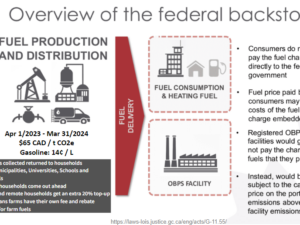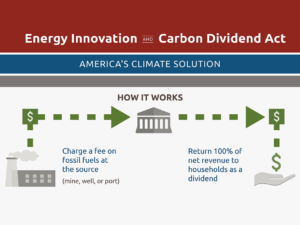Briana Smith at Citizens’ Climate Lobby’s world headquarters in Coronado, California recently sent an email asking for help, “A very detail oriented mayor in California would like to know why didn’t the rest of Canada adopt BC’s version of CFD?” Great question and here is our answer: EACH PROVINCE HAS ITS OWN SPECIAL CHARM: Canada is a Confederation of Provinces with vastly different demographics, history, natural resources and economics. As well, under the Canadian constitution, provinces have a lot say over their natural resources and energy policies. BIG POLICES FIRST ROLL OUT IN PROVINCES: Canada has traditionally allowed provinces to develop new big programs and eventually the federal government has stepped in to consolidate and nationalize programs. Our income tax and national health care systems are two such examples. BC IS PROGRESSIVE: BC is full of natural beauty and environmentalists. It is the birthplace of Greenpeace and David Suzuki. British Columbia is by far the most progressive province in Canada. They adopted the best carbon pricing policy to date in the Western Hemisphere in 2008 and as an Ontarian, I have carbon pricing envy. ONTARIO DID OTHER THINGS: It should be noted that Ontario created a policy to shut down all coal-fired power plants and achieved that goal in 2014. We also had a a feed-in tariff program called the Green Energy Act that kick started the conversion to clean energy in Ontario. ONTARIO CONSERVATIVES SLOW TO THE GAME: We have a Liberal (like your Democratic Party) government in Ontario. A big problem in Ontario was the Progressive Conservatives (akin to the GOP) denied the climate issue was serious making it difficult for the provincial government to do much – until recently. Ontario Progressive Conservatives are now embracing revenue neutral carbon pricing though, while the Ontario Liberal Party strongly supports cap and trade. QUEBEC AND ONTARIO POLITICS OFTEN DOMINATED BY BIG CITIES: Ontario and Quebec politics are often dominated by the big cities of Toronto and Montreal – full of lawyers, big unions, big business and financial institutions. It is difficult for the needs and wants of citizens and small businesses to be heard above the noise especially since our political finance rules at the provincial level allow for money to have influence, which are currently under careful scrutiny this week. QUEBECERS WERE AHEAD OF THE CURVE: As well, like California, Quebec embraced the Kyoto Protocol and the urgency of the climate crisis in the 2000’s and signed on to the Western Climate Initiative cap and trade system (WCI) in 2008. Now Ontario and Manitoba will join them. IS THE WCI WINDOW DRESSING?: It should be noted that the floor price for carbon in the WCI is currently $17.50 USD set to rise at a 5% increase per year (1) , thus will $30.00 per tonne by 2030 which is sadly too low to do much (2). PM HARPER WOULD NOT TALK ABOUT CARBON PRICING: There was lack of political leadership at the federal level. For almost ten years in Canada our former Prime Minister, the Right Honourable Stephen Harper of the Conservative Party of Canada, pretty much shut down all discussion on climate change nationally. He never met with the provinces to discuss climate change and the rhetoric out of Ottawa was very anti-carbon pricing. Thus the provinces took lead on the issue. PRIME MINISTER JUSTIN TRUDEAU’S CAMPAIGN PROMISE: One of Prime Minister Justin Trudeau’s election promises was to bring the provinces together to begin a national dialogue on climate change, which include carbon pricing, within 90 days of being elected. He has done just that with the Vancouver Declaration and you can read about it here. Please take a moment as well to learn more about the differences between carbon fee and dividend and the BC Carbon Tax here. (1) How carbon taxes can grow the economy and give Canadians a break. McLeans Magazine, March 3, 2016 by Mark Cameron, Canadians for Clean Prosperity (2) Frequently Asked Questions about Quebec’s Cap and Trade System for Greenhouse Gas Emission Allowances. Government of Quebec. Why didn't Canada adopt BC's Carbon Tax?

BLOG: Why didn’t Canada adopt BC’s Carbon Tax?
Home » CCL Canada News » BLOG: Why didn’t Canada adopt BC’s Carbon Tax?





